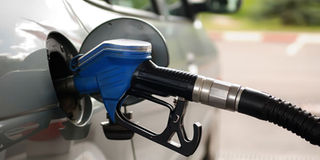We have no control over fuel prices, says Energy ministry

A vehicle being fuelled. Dealers in fuel have been warned against selling adulterated fuel. FILE PHOTO
What you need to know:
- Reason. Government says the economy is now liberalised.
- The UNBS inspector of fuel outlets for south western region, Mr Lawrence Kitimbo, said there is a tendency of putting cheaper prices at the bill boards at the entrance of the fuel stations to attract customers when actually what is charged is higher than that
Mbarara. The assistant commissioner Petroleum Supply, Ministry of Energy, Mr John Friday, has said government has no control over fuel prices because Uganda is a liberalised economy.
While addressing motorists from southwestern sub-region in Mbarara on Tuesday, Mr Friday said prices of goods and services in the country are determined by forces of demand and supply but not government.
“The ministry of Energy organised this workshop in conjunction with Uganda National Bureau of Standards (UNBS) to show what fuel we give you and how it is given to you but we cannot regulate prices.
“Sometime back in 1994 we had only six companies selling fuel in Uganda but since then the policy has been changed. The economy was fully liberalised and there are so many companies so prices are determined by forces of demand and supply, the consumer is always the boss, if you want prices to lower, do not buy from stations that sell at high prices so that they can reduce on their price,” said Mr Friday during a sensitisation workshop on fuel marking and quality monitoring.
He was responding to participants’ complaints about the current high fuel prices.
Mr George Agaba, the vice chairperson Kanungu District asked government to regulate fuel prices which he said are high mostly in rural areas and affect development. A litre of diesel in the region currently costs Shs3,080 while petrol costs Shs3,650.
Mr Friday further noted that some fuel retailers in Uganda increase prices because they offer other services that protect vehicle engines, adding that prices are also influenced by the exchange rate between the Shilling and Dollar.
“Prices change because of transport costs of fuel from the loading stations, foreign exchange in the global market and some fuel companies put in some more lubricants that protect the engine of the vehicle. This brings about price differences but what we want is to give our people power so that when they are cheated they know where to report such that different measures are taken,’’ Mr Friday said.
The UNBS inspector of fuel outlets for south western region, Mr Lawrence Kitimbo, said there is a tendency of putting cheaper prices at the bill boards at the entrance of the fuel stations to attract customers when actually what is charged is higher than that.
“When you see a cheap price tag at the road side billboard of the fuel station, make sure you check whether that price indicated is still the same at the pump used to dispense fuel into your tank,” said Mr Kitimbo.
He added: “Stop sitting in your vehicle and ordering because they can put anything in your car which can affect it. Always make sure that the pump starts from zero; if not, report to the supervisor.”
He said any fuel station that is found violating the guidelines like giving customers adulterated fuel and cheating motorists will be the closed and the person in charge arrested and prosecuted.


